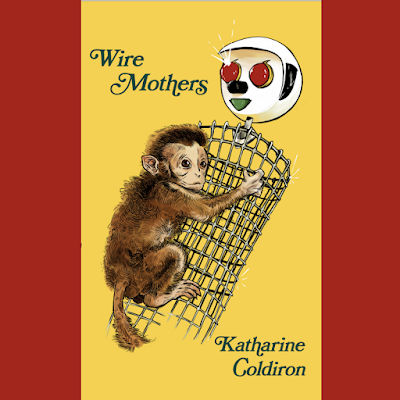The other day I was in a bad mood and I dragged myself outside for a walk with Matt. I told him all about the book I'm reading (a biography of a producer in early Hollywood), and the sunshine and fresh air plus my interest in the stuff I told Matt improved my mood extraordinarily. When I got home I picked up my phone and looked at Twitter, and I felt my good mood drain away. I felt it, the way you can feel your bladder deflate when you pee.
I looked at the phone in my hand and I went: oh.
Later, I told Matt about this, calling my phone the Doom Box. Now, every time I pick it up, I think about that phrase. I keep opening Twitter and feeling that draining sensation. It used to make me happy to interact there, but not so much now. I know I'm not getting the best of it, for obvious reasons, and I'm sick of fighting the algorithm to see and be seen. I had been thinking about taking a long break from it once Wire Mothers was out, and now that I've had this insight, and I'm near the end of the initial promo cycle for the book, I'm closer to doing so. (As for the other monsters in the Doom Box, Facebook is scrapple to Twitter's steak for me, and for whatever reason, IG offers almost no dopamine hits compared to the others.)
My main question about this is no longer "how do I promote myself?" - because the Wire Mothers launch has not gone smoothly, and I seem to have sold copies nonetheless - but "what do I do with my time instead?" I think the answer has to do with the Star Trek: Voyager project I've semi-begun and am going to start in earnest when Jami Attenberg's yearly 1000 Words of Summer project begins on June 1. But I also hope to write some more about film on my Medium page and some more about myself here. And I want to read some damn books; my writing/reading balance has been way off lately.
I've said this before, but: as a writer, I didn't really make career progress until I engaged on Twitter. I got most of my cornerstone opportunities there, whether by chance or by effort. I don't know if I have enough career momentum to slack off on it and still find success, but I want to try it and see. I'm in a phase now where writing is its own reward, and finding people to read my work isn't like selling encyclopedias door to door. That won't be true forever, but it is for now, so it might be a good time to untether.
It's spring here, which means the exact weather that people think happens all year round in LA: sunny, mild, pleasant breeze. The weather is nicer and more consistent than any May I can remember in LA. It was over 100F in May 2017, the month I got my MA from CSUN; it was an annoyingly hot weekend to celebrate.
Tomorrow Matt and I are going to the Academy Museum to look at a Casablanca exhibit, as well as the Dykstraflex and whatever else is on at the moment. We got a flyer in the mail that shows some of the Casa objects on display, and one of them is the model globe from the opening, which is grayscale in color. It hadn't occurred to me that they'd use a black and white model of Earth, because it's Earth, why wouldn't it be in color, but it appears they did. I eternally love movie stuff/secrets like this.
Speaking of which, I just finished a biography of Jean Harlow's husband Paul Bern, who died under mysterious circumstances in 1932. Even though the likely cause of his death has filtered through to the public after 90 years of MGM coverups, the circumstances are still swathed in questions that no one can answer because everyone is dead. Death surrounds this story: Paul, Jean, their close associate Irving Thalberg, Paul's previous wife, they all died unexpectedly, all prior to 1938. One of the few major players involved who lived a long life was LB Mayer, of whom this book has given me an appalling impression. Jack Warner may have been a cartoonish supervillain (with unerring instincts), but Mayer was the kind of to-the-bone horrible that doesn't make for good stories after the fact. He was just bad, just mean, just selfish. Perhaps this book was wrong in casting him as such a perpetrator - it's wrong about a bunch of other things - but I tend not to think so.
As Conrad Nagel's eulogy of Paul put it:
Hollywood is cruel and brutalizing to those seeking success. In no other place is the struggle for success so cruel. It is difficult not to bow down to one of Hollywood's false idols -- the keenest and most dangerous being insincerity.
But I still fall to my knees. I can't help it. The fact that I'm considering another novel set in the 1930s and intricately entangled with film, despite how the Casa novel exhausted me, demonstrates how helpless I am, how strong is Hollywood's power over me.



